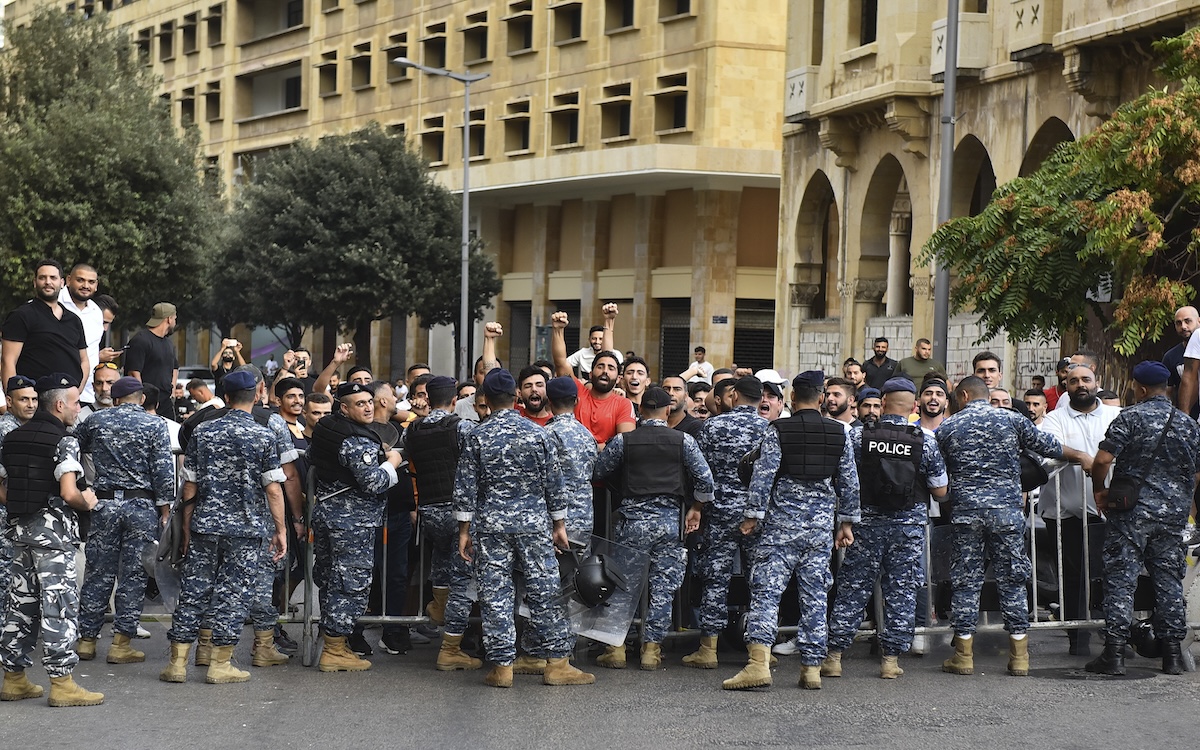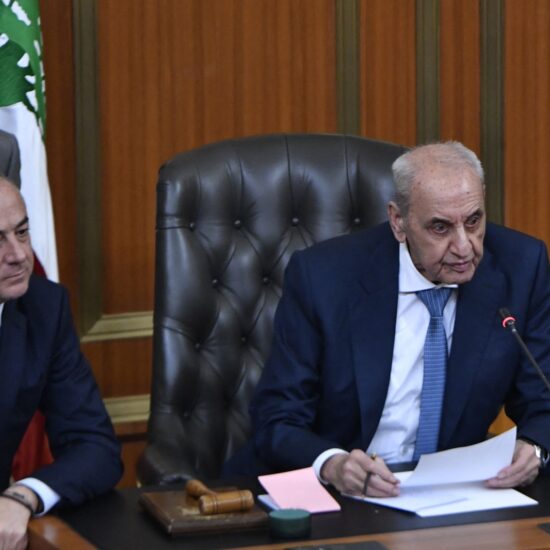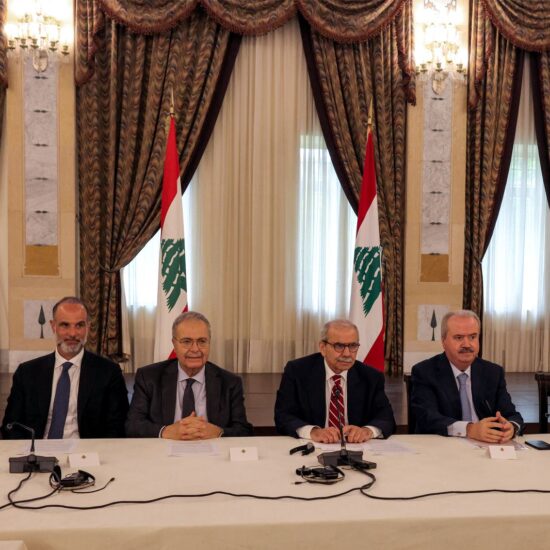
Lebanon’s LGBTQ+ community has always been marginalized.
While it is technically not illegal to be gay in Lebanon, and there has long been a thriving LGBTQ+ community in the country, they have also been the targets of crimes and harassment for years under the justification of Article 534 which criminalizes “relations against nature.”
As of late, the community has been increasingly targeted by conservative political and religious forces in the country in an attempt to use them as scapegoats to distract the population from the larger problems that Lebanon is facing.
This happened once again when a collective of organizations held a “freedom march” in Beirut to demonstrate against the growing crackdown on freedoms of expression, speech, and more in the country.
During the protest, plainclothed individuals attacked the marchers, shouting obscenities about how they are promoting homosexuality in Lebanon.
The demonstration, which was meant to travel from Raid el-Solh Square in Downtown Beirut, one of the hotspots during the 2019 uprising, to the Interior Ministry’s headquarters in Sanayeh, was attacked almost as soon as it started.
View this post on Instagram
Three people were reportedly injured in the attack.
It is worth noting that the demonstration was not centered around the LGBTQ+ community and had more to do with the growing lack of freedoms in Lebanon.
Regardless, the attackers accused them of promoting homosexuality, cracking down on freedom of expression while attacking a group of people in Lebanon who have limited room to speak – or even exist for that matter.
Lebanon is still largely considered as being a liberal bastion in the Middle East but it is becoming increasingly limited on who is “free”.
In Lebanon
The end of a dream: Members of Lebanon’s Armenian diaspora clashed with security forces in front of the Azerbaijan embassy on September 29 after it was announced that the contested region of Nagorno-Karabakh would dissolve and become a part of Azerbaijan.
The protest came as around 80 percent of Nagorno-Karabakh’s inhabitants fled the area to Armenia amid fears of violence by Azerbaijani forces.
While considered internationally as a part of Azerbaijan, the vast majority of Narogno-Karabakh’s residents were ethnic Armenians who called the area Artsakh.
Armenia and Azerbaijan have fought several brutal wars over the area, but it was only recently after fierce Azerbaijani aggression that Azerbaijan was finally able to take control of the area.
Late fees: Protests from the General Students Union were forcefully dispersed from the Middle East Airline’s office in Hamra on September 28.
View this post on Instagram
The members of the student union were demanding that the airline pay the $52 million owed to the Lebanese University for PCR tests that were taken at the airport during the pandemic.
There has so far been no accountability for the money owed to the university.
The Lebanese University is Lebanon’s only public university and is extremely underfunded.
Identification, please: Violent clashes took place in the village of Laboueh in Baalbek after an individual refused to comply at a checkpoint at the entrance of the village.
View this post on Instagram
The clashes took place between the army and members of the Rabah family after one man, identified as N.A.R., refused to stop at a checkpoint even after the army fired warning shots in the air.
Two people were reportedly injured in the clashes.
The final straw: France’s envoy to Lebanon Jean-Yves Le Drian told AFP that the group of five, France, Egypt, Qatar, United States, and Saudi Arabia, were considering making changes to Lebanon’s financial aid depending on how the presidential elections play out.
The French envoy stated that the five nations were “deeply irritated & questioning the sustainability of their funding to Lebanon while political leaders take pleasure in irresponsibility.”
This likely means that if Lebanon continues to delay electing a president, then the aforementioned countries could cut their financial support to the ailing Mediterranean country.
Countries have continued to make threats to the political leadership about Lebanon’s refusal to elect a president or pass economic reforms, but few if any of these threats have come to action.
There is currently a push by the five nations to have a third candidate elected president as neither of the two main current candidates, the opposition’s Jihad Azour and Hezbollah’s Sleiman Frangieh, have much of any chance of getting elected at this point.
Stealing from the poor: The Bank of Beirut is charging account holders who have “old” dollar accounts in an attempt to get them to open new accounts.
Account holders are reportedly being charged $100 per month and were informed that they would not be subjected to this fee if they deposited fresh dollars into a “new” account which would bring more money into the bank.
This puts depositors in a difficult position where they can either maintain their current accounts but lose $1,200 a year or open a new account and put money in one of Lebanon’s many struggling banks.
Banks in Lebanon charging fees is nothing new, but the Bank of Beirut’s latest attempt to extort its depositors could set a dangerous precedent for other banks going forward.
In the region
Thwarted attack: Turkish security forces stopped an attack on the Ankara police headquarters on October 1 before the Turkish parliament was set to reconvene with a speech by Turkey’s president, Recep Tayyip Erdogan.
The attack began after one person blew themselves up inside the gate of the police headquarters while a second person was killed in clashes with the police.
Two officers were lightly injured.
No one has taken credit for the attack so far.
Later that same day, Turkish forces bombed Kurdish areas of northern Iraq although armed Kurdish groups like the Kurdistan Workers Party (PKK), which has been fighting with Turkey for years, have not claimed any involvement for the attack.
Welcome to the USA: The United States is adding Israel to its Visa Waiver Program which will allow Israelis to travel to the US without first requiring a visa.
This decision came after Israel agreed to allow American Palestinians to visit Israel and Palestine without a visa as well, though they would remain subject to security concerns and it could take them some time to be admitted to the country, especially if they are looking to go to Gaza.
The decision by the US has been condemned by many Palestinians for rewarding Israel despite its continued occupation of Palestine and abuse of Palestinians.
A lawsuit has been filed in the US against the decision.
Getting closer: Saudi Arabia and Israel appear to be getting closer to normalizing relations after Israel’s tourism minister visited Riyadh and a Saudi envoy visited the West Bank.
Saudi Arabia and Israel have been in talks, organized by the Biden administration, to normalize relations which would prove to be a huge victory for embattled Israeli Prime Minister Benjamin Netanyahu.
One major sticking point has been Saudi Arabia’s public statements claiming that there can be no normalization before Israel promises significant concessions to the Palestinians. However, Saudi Arabia’s crown prince and de facto ruler, Mohammed bin Salman, has shown that he is not afraid to break tradition and could possibly agree to a normalization agreement without any concessions if he feels the agreement would benefit himself and his country more.
Normalization between Saudi Arabia and Israel would be one of the most significant agreements in the region since the Oslo Accords.
A deadly wedding: Over 100 people were killed after a fire engulfed a wedding venue in northern Iraq on September 26.
The fire broke out after Roman candle fireworks went off, setting the roof on fire.
In a report since the fire broke out, the wedding hall was allegedly constructed with cheap and unsafe materials.
This has since led to an outcry in Iraq over the shoddy and cost-cutting techniques used in construction sites in the country.
What we’re reading
Slight progress: Since Wassim Mansouri took over as Lebanon’s Central Bank’s interim head, he has slowly returned BDL to a more traditional role of a central bank. However, Maan Barazy wrote about how rating agencies have largely downplayed this progress due to its limited impact because of the continued refusal by the government to pass and implement reforms.
Home away from home: The American University of Beirut has long been considered one of Lebanon’s crown jewels. But the economic crisis had a significant impact on the institution along with other universities throughout the country. NOW’s Robert McKelvey wrote about AUB’s new twin campus that was recently opened in Cyprus in the hopes of revitalizing Lebanon’s education system.
An example for peace: The Palestinian-Israeli conflict has been going on for decades with many viewing the possibility of coexistence as impossible, especially as a far-right government is in power in Israel. The New York Times’s Hiba Yazbek went to the Oasis of Peace, a village between Tel Aviv and Jerusalem, where Israelis and Palestinians have found a way to live together in peace, even when it is tested at times.
Lebanon+
Podcasts: In the latest episode of Sarde after dinner, Médéa Azouri and Mouin Jaber sat down with clean energy entrepreneur Assaad Razzouk about veganism, what is killing the planet and what is going on with climate change.
Until next week, follow NOW Lebanon on Twitter, Instagram, Facebook, and LinkedIn. And stay safe!








